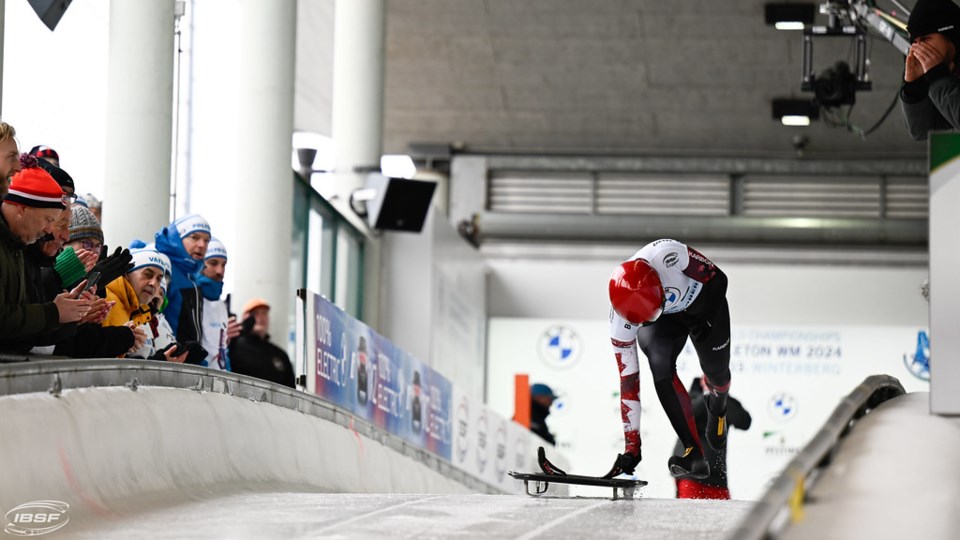For the first time since COVID-19, Canada hosted a nationals event for skeleton on March 31—and several top talents were in Whistler to strut their stuff.
Hallie Clarke maintained her winning ways with a Sunday breakthrough: a combined two-run time of one minute and 48.70 seconds. Veteran racer Jane Channell finished second (1:49.83) and Grace Dafoe rounded out the top three (1:51.82).
Squamish’s own Payton Spence wound up sixth (1:58.16).
Meanwhile, Josip Brusic slid to the gold medal among men (1:49.09) ahead of Kyle Donsberger with silver (1:49.22). Bronze went to Jordan Rwiyamilira (1:49.31).
“Our program has gone through a lot in these past few years … so I think [this race] means a lot in terms of where our program is,” Clarke said. “How exciting it is to be able to race with your teammates in nationals and how supportive everyone was meant a lot, too. It was a really good way to end the year.”
Added Dafoe: “We haven’t had a Canadian Championship for skeleton in quite a few years, so even to know that we had it on the schedule was really, really exciting. I went in with no expectations, but placing third was awesome. Any placement within those women, I would have been happy with because we’re so united.”
A new direction
The closest that Bobsleigh Canada Skeleton (BCS) may ever come to a major free agent signing was in November 2023, when Clarke returned to the Maple Leaf. The Brighton, Ont. native spent her debut World Cup campaign with Team USA, earning two silver medals and a World Championships top 10 under the American banner.
“The direction that BCS was heading and the coaching staff that was hired was probably the biggest reason I came back,” explained Clarke. “The easiest way to see that is the success we all had as athletes. It was a really great year for us, and I truly do think that it’s just going to keep getting better.”
Clarke led the pack this season, making history as the youngest woman ever to strike gold at an IBSF World Championship. She held serve on Feb. 23 over four runs to best Kim Meylemans of Belgium and home-turf favourite Hannah Neise, not long after winning the 2023 Junior World Championships—which were also in Winterberg, Germany. Her triumph made a lasting impact on her teammates.
“I was cheering, I was crying, I was feeling all the emotions,” remembered Dafoe about the day she watched Clarke seize glory. “It's so exciting for our program, but also just for Hallie. When I get to train with her, I get to see how far back I am from the best athletes in the world. Even though she is a bit younger than me, she very much mentored me when I raced my first World Cup this year, just prior to the World Championships.
“At the end of the day, Hallie’s just a fantastic human. She's a fantastic teammate, we're really excited for her.”
Clarke was humble in the face of such praise, emphasizing that she in turn looks up to Dafoe, Channell and many of her other teammates to help her grow as an athlete. She also lauded new BCS head coach Joe Cecchini and technical coach Micaela Widmer—both formerly of the Whistler Sliding Centre (WSC)—for what they and former Olympian Kevin Boyer have done.
“Providing opportunities for people is one of the biggest factors, but they've also brought all of the athletes together in an environment that really allows you to celebrate and support each other,” Clarke said. “I think that that part was missing before. Everyone had so much fun this past week [in Whistler] and any time that we're all together as a team.”
World’s fastest ice
The WSC may not be the most famous track of its kind. Others in Winterberg, Lake Placid or Lillehammer may be more elegant, with their smooth, gliding turns and storied reputations…but nobody takes for granted the opportunity to test themselves on Earth’s fastest ice.
“I stand by the statement that if you can slide at the Whistler Sliding Centre, you can learn any track in the world,” Dafoe opined. “It's one of the most technical and one of the most difficult for us.
“There is actually an aura when we travel internationally and people are going: ‘oh, you train in Whistler?’ [Hearing them talk], they mention some fear around it…but for us it’s just another day of training.”
Clarke concurs. Having experienced a bevy of new tracks for the first or second time this year, she leaned on her time at the WSC for confidence.
Now with a much-deserved offseason ahead, Canada’s female skeleton racers and their male peers will look to recharge before turning their focus to summer training.




